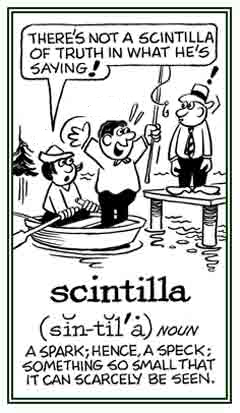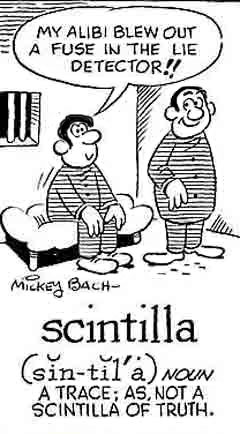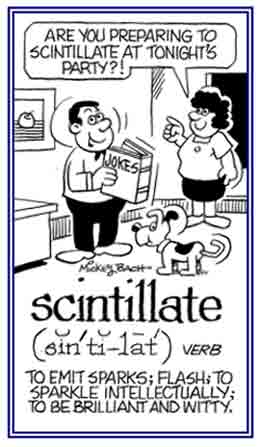scintill-, scintil-, scinti-
(Latin: light, shine, spark, sparkle, twinkle)
2. Scintigraphic imaging of a lesion using labeled monoclonal antibodies or antibody fragments which are specific for the antigen associated with the lesion.
2. Imaging of small anatomic structures by use of a radionuclide in conjunction with a special collimator which "magnifies" the image; for example, the use of technetium-99m in conjunction with a pinhole collimator to image the lacrimal drainage.
Cisternography is the radiographic study of the basal cisterns of the brain after the subarachnoid introduction of an opaque or other contrast medium, or a radiopharmaceutical with a suitable detector.
From scinti (llation) plus gram.
2. A scintigram: A two-dimensional record of the distribution of a radioactive tracer in a tissue or organ, obtained by means of a scanning scintillation counter.
2. The process of producing a scintigram.
2. Something that is very small, a smidgen: The recipe called for a scintilla of salt which was much less than the usual amount.
3. A small trace or barely perceptible amount of something; such as, proof supporting a position: There isn't a scintilla of evidence to support the politician's accusations that his opponent is a liar.
4. Etymology: from Latin scintilla, "particle of fire, a spark, a glittering speck."


Go to this Word A Day Revisited Index
so you can see more of Mickey Bach's cartoons.
2. Having brief brilliant points or flashes of light.
2. To express, emit, or to incite liveliness: To scintillate a conversation or performance results in it being much more interesting.
3. Etymology: from Latin scintillare, "to sparkle, to flash."

Go to this Word A Day Revisited Index
so you can see more of Mickey Bach's cartoons.
A well-known "scintillating" poem
Scintillate, scintillate, globule vivific!
Fain would I fathom thy nature specific,
Distantly poised in the ether capacious,
Closely resembling a gem carbonaceous.
Do you have a problem understanding this sesquipedalian version? If so, here it is in a simple format.
Twinkle, twinkle, little star!
How I wonder what you are,
Up above the world so high,
Like a diamond in the sky.
2. Relating to something or someone that is interesting, exciting, and clever: Jack and Jill were having a scintillating conversation with a scintillating personality when they were at their friend's birthday party yesterday.
3. Etymology or origin: from Latin scintillatus, past participle of scintillare "to sparkle, to glitter."

Go to this Word A Day Revisited Index
so you can see more of Mickey Bach's cartoons.
Etymologically related "light, shine, glow" word families: ethero-; fulg-; luco-; lumen-, lum-; luna, luni-; lustr-; phengo-; pheno-; phospho-; photo-; splendo-.

